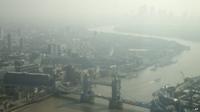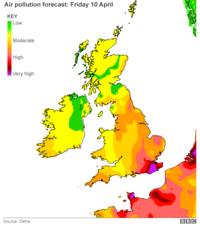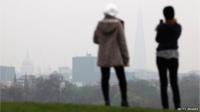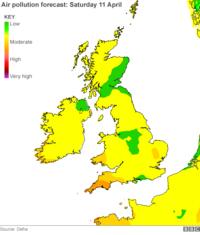
Parts of the UK could reach the highest level of air pollution later, prompting health warnings for vulnerable people.
Warm, still conditions combined with traffic fumes, pollution from Europe and Saharan dust from the south have seen six regions head towards level 10.
Much of the South East and eastern England will see "high" levels of pollution, although the problem is expected to be short-lived.
Defra said overnight Atlantic winds will disperse polluted air by Saturday.
It said that while no regions have reached the highest level of air pollution so far, six regions that have hit a level of pollution up to level 9.
These are eastern England, south-east England, Greater London, West Midlands, East Midlands, and Yorkshire and Humberside.
In areas experiencing very high levels of air pollution, adults and children with lung problems, adults with heart problems and older people are advised to avoid strenuous activity.
People are also advised to avoid busy roads and those who carry a reliever inhaler, such as asthma sufferers should always have it with them.

How concerning?

By James Gallagher, Health editor, BBC News website
Healthy people tend to notice air pollution as a dry throat, sore eyes or a tickly cough.
But it can have a more serious impact on health by being the trigger for a heart attack or by making asthma worse.
Even low levels of air pollution can harm the health of people who are particularly sensitive.
But on Friday pollution will hit "level 10" or "very high" - the highest category of air pollution in the UK.
It does not mean people need to stay indoors.
But it is the only category of air pollution at which at-risk people - those with heart or lung problems and the elderly - are told to completely avoid strenuous physical activity.
Even healthy people are told to cut down on the amount of physical exertion.
However, the pollution will be brief and levels will drop to low/moderate by Saturday.
Longer-term thinking 'needed' on air pollution
For the latest forecast in your area visit BBC Weather.


Dr Penny Woods, chief executive of the British Lung Foundation, said: "This latest high air pollution episode, coming so soon after the last, is troubling, and could again put people living with respiratory conditions at risk of worsening symptoms."
A Defra spokeswoman said: "This is expected to clear on Saturday and pollution levels will return to low throughout the morning."
Professor Paul Monks, chairman of the Air Quality Expert Group, said air pollution is not taken seriously enough because it is an "invisible menace".
"If they can't see it they often don't think about it," he said.


What is meant by pollution?
Aside from the Sahara dust, the pollution is made up of various substances, including nitrogen dioxide, sulphur dioxide and ammonia.
These form particles in the atmosphere. The two most common measurements are particulate matter measuring 2.5 micrometres or less, known as PM2.5; and larger particles measuring 10 micrometres, known as PM10.
PM2.5 particles are thought to be particularly damaging because they are so small, they can penetrate into the deepest parts of the lungs.
They come primarily from vehicle exhausts.
WHO air quality guidelines

"This episode at the moment is one of about a dozen episodes a year," said Simon Birkett, founder of campaign group Clean Air in London.
"Day in day out the average levels of nitrogen dioxide on many roads in central London will tend on average to be the highest in the world."
A case brought by environmental lawyers Client Earth against the government over levels of air pollution that breach European Union rules is shortly to return to the Supreme Court.
Philip Insall, director of health for cycling charity Sustrans, described the state of air pollution in Britain as "criminal" and a "national embarrassment".
He said: "The next government will need to get a grip on air pollution.
"That will mean serious, dedicated investment and an effective programme of action to help more people out of their cars and choosing walking and cycling for short journeys."
European Union rules set limits on the levels of pollutants in the air such as sulphur dioxide, nitrogen dioxide and lead.


Are you affected? What measures are you taking to avoid exposure to pollution? Email haveyoursay@bbc.co.uk with your stories.
If you would be happy to speak further to a BBC journalist, please include a contact telephone number.
Email your pictures to yourpics@bbc.co.uk, upload them here, tweet them to @BBC_HaveYourSay or text 61124. If you are outside the UK, send them to the international number +44 7624 800 100.
Or WhatsApp us on +44 7525 900971
Read our terms and conditions.
Anda sedang membaca artikel tentang
UK pollution forecast prompts warning
Dengan url
http://beritaberbagiceria.blogspot.com/2015/04/uk-pollution-forecast-prompts-warning.html
Anda boleh menyebar luaskannya atau mengcopy paste-nya
UK pollution forecast prompts warning
namun jangan lupa untuk meletakkan link
UK pollution forecast prompts warning
sebagai sumbernya
0 komentar:
Posting Komentar